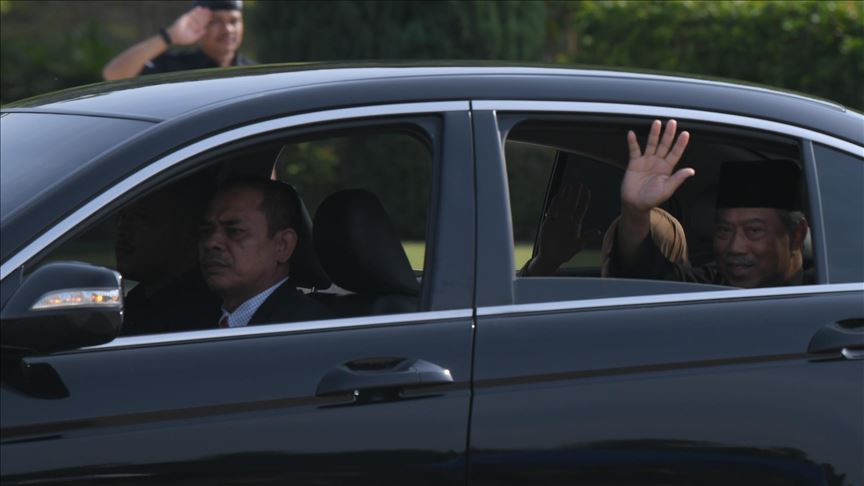Muhyiddin Yassin: An opportunistic rise to power
Muhyiddin saw the chance to be Malaysia's new prime minister and used his decades of political experience to seize it
 The President of Parti Pribumi Bersatu Malaysia (PPBM) Tan Sri Muhyiddin Yassin arrives at the Royal Palace for the official sworn in by Yang di-Pertuan Agong or King of Malaysia in Kuala Lumpur, Malaysia on March 1, 2020. Muhyiddin Yassin, ellected and announced as the 8th Prime Minister of Malaysia on yesterday after the official meeting with all the Members of Parliament last week. ( Syaiful Redzuan - Anadolu Agency )
The President of Parti Pribumi Bersatu Malaysia (PPBM) Tan Sri Muhyiddin Yassin arrives at the Royal Palace for the official sworn in by Yang di-Pertuan Agong or King of Malaysia in Kuala Lumpur, Malaysia on March 1, 2020. Muhyiddin Yassin, ellected and announced as the 8th Prime Minister of Malaysia on yesterday after the official meeting with all the Members of Parliament last week. ( Syaiful Redzuan - Anadolu Agency )
KUALA LUMPUR, Malaysia
Muhyiddin Yassin was sworn in as Malaysia's eighth prime minister on Sunday morning, marking the end of a tumultuous week in the country’s politics.
The unrest, however, seems far from over as his predecessor, veteran statesman Mahathir Mohamad, has vowed to challenge Muhyiddin’s rise to the country’s highest democratic office.
For now, though, Muhyiddin, 72, is in the driving seat and his journey to become premier has been one worthy of attention.
Born in May 1947 in the southern state of Johor, Muhyiddin’s political career started when he joined the United Malays National Organization (UMNO) as an ordinary member in 1971.
The same year he completed his undergraduate degree in economics and Malay studies at the University of Malaya in the capital Kuala Lumpur.
Up the ladder
His first step up the political ladder came in the 1978 elections, when he won the parliamentary seat for Pagoh, a town in Johor’s Muar district, on a UMNO ticket.
Muhyiddin retained the seat until 1982 and four years later in 1986 he was elected the chief minister of Johor state.
His tenure lasted just under a decade as he was made the minister for youth and sports in 1995 and held the position until 1999.
That year, he was named as the trade and domestic consumers minister and gave up the post in 2004 to become the agriculture minister.
His four-year stint ended in 2008 when he was made the minister of international trade and industry, a position he held for little over a year.
In April 2009, ex-Premier Najib Razak, who is now on trial for corruption and money laundering, chose Muhyiddin to be the deputy prime minister of Malaysia.
He simultaneously served as the education minister, a position he used to make Malay the language of instruction for mathematics and science in all primary and secondary schools.
Switching sides
Muhyiddin’s alliance with Najib ended in 2015 when he was removed as deputy premier for his remarks on the then-prime minister’s handling of the now infamous 1Malaysia Development Berhad (1MDB) scandal.
A year later, after his UMNO membership was also rescinded, Muhyiddin joined hands with Mahathir to form the Malaysian United Indigenous Party (PPBM).
He became the new party’s president, while Mahathir took the post of chairman.
The PPBM then formed the Pakatan Harapan (PH) coalition with three other parties to contest the 2018 general elections.
The strategy was a success as the PH managed to defeat the Barisan Nasional alliance, which had ruled the country since independence in 1957.
As the prime minister, Mahathir made Muhyiddin the country’s interior minister.
He held the post until last Monday, Feb. 24 -- the day Mahathir resigned as prime minister and inadvertently cleared Muhyiddin’s path to the one office that eluded him till now.
The 94-year-old’s decision to quit as premier split the PPBM into two camps; one supporting Muhyiddin, and the other backing Mahathir, who also resigned as the party chairman.
Muhyiddin, in his capacity as the PPBM president, also pulled the party out of the PH coalition and reached out to opposition parties, including UMNO, to garner support for his candidacy as the next prime minister.
The move worked for Muhyiddin as the Malaysian king, after interviewing 222 lawmakers, decided that the man from Johor had enough support to be named premier.
The king’s decision came despite Mahathir having a change of heart and declaring his interest to take back the position of prime minister.
That is why when Muhyiddin was taking the oath of office on Sunday morning, Mahathir announced his intent to call for a vote in the parliament to determine the legitimacy of his election.
For now, Muhyiddin’s strategic moves have helped him reach the place he aimed for in his nearly four decades in politics.
But holding on to his newfound power may prove to be yet another challenge for Muhyiddin over the coming days.
Anadolu Agency website contains only a portion of the news stories offered to subscribers in the AA News Broadcasting System (HAS), and in summarized form. Please contact us for subscription options.




